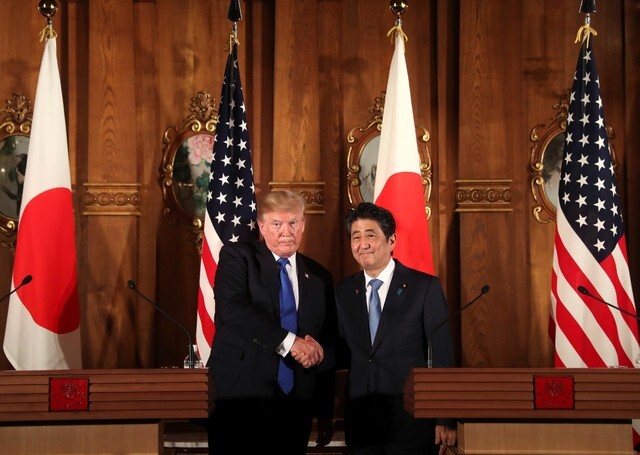hankyoreh
Links to other country sites 다른 나라 사이트 링크
Trump pushes US weapons on Japan during last day of visit

US President Donald Trump explicitly demanded the purchase of US weaponry during a joint press conference after Nov. 6 summit with Japanese Prime Minister Shinzo Abe.
In the press conference, Trump said Abe would be able to shoot down North Korean missiles “when he completes the purchase of lots of additional military equipment from the United States.”
Trump also demanded action to correct the trade imbalance between the US and Japan, calling the current trade situation “unfair.” The remarks are seen as foreshadowing pressure to come on trade and weapons purchasing when Trump visits South Korea on Nov. 7.
Speaking at the post-summit press conference at the state guesthouse in Tokyo’s Minato ward on the afternoon of Nov. 6, Trump answered a question on why Japan did not shoot down North Korean missiles that passed through its airspace in August and September.
“He [Abe] will shoot [North Korean missiles] out of the sky when he completes the purchase of lots of additional military equipment from the United States,” Trump replied.
“He will easily shoot them out of the sky,” he added.
“The Prime Minister of Japan is going to be purchasing massive amounts of military equipment, as he should. And we make the best military equipment, by far,” he continued, sending an overt message of pressure to buy US weapons.
“The F-35 fighter...is the greatest in the world,” Trump added. Abe went on to note that Japan had already introduced F-35 fighters and state-of-the-art SM-3 Block IIA interception missiles from the US.
Trump also sent a blunt message to Japan on relieving the current trade deficit.
“I am committed to achieving a fair, free, and reciprocal trading relationship. We seek . . . to eliminate our chronic trade imbalances and deficits with Japan,” he said at the press conference.
Trump was critical of Japan in a speech earlier that morning before business world figures from the US and Japan, declaring that “our trade with Japan is not fair and it's not open.”
He also said the Trans-Pacific Partnership (TPP) was “not the right idea,” dashing hopes in Japan that the US might return to the agreement.
Trump’s trade pressures are likely to continue when he arrives in China and Japan. During the press conference, he said, “The problem we have with China is that . . . it's been a very unfair trade situation. Our trade deficit is massive. It's hundreds of billions of dollars a year.”
“[The trade deficit] has to come down,” he declared.
A senior Blue House official said the South Korean administration was “obviously expecting President Trump to demand renegotiation of the South Korea-US FTA” and “making definite preparations for that.”
On the issue of weapon purchasing, the same official said, “We’ve made requests to the US in terms of acquiring or developing state-of-the-art weaponry in the interest of improving the South Korean military’s independent defense capabilities and combined South Korean-US defense capabilities.”
“It’s not going to be a matter of President Trump unilaterally demanding that we buy weapons – it’s an issue of how our demands are going to be met,” the official said.
On the North Korea issue, Trump declared that the “era of strategic patience is over” – referring to the approach adopted by his predecessor Barack Obama – and backed Abe’s calls for stronger pressure on Pyongyang. He provided another political gift to Abe by meeting with the family members of Japanese nationals abducted to North Korea.
But in terms of Japan’s calls for a “free and open Indo-Pacific” strategy to counter China, Trump merely stressed the importance of lowering trade deficits to achieve fair and free trade. In general, he shifted the focus toward trade issues and prioritizing US interests – a clear signal that he and Abe are pursuing two different visions.
By Cho Ki-weon, Tokyo correspondent and Seong Yeon-cheol, staff reporter
Please direct questions or comments to [english@hani.co.kr]

Editorial・opinion
![[Column] Has Korea, too, crossed the Rubicon on China? [Column] Has Korea, too, crossed the Rubicon on China?](https://flexible.img.hani.co.kr/flexible/normal/500/300/imgdb/original/2024/0419/9317135153409185.jpg) [Column] Has Korea, too, crossed the Rubicon on China?
[Column] Has Korea, too, crossed the Rubicon on China?![[Correspondent’s column] In Japan’s alliance with US, echoes of its past alliances with UK [Correspondent’s column] In Japan’s alliance with US, echoes of its past alliances with UK](https://flexible.img.hani.co.kr/flexible/normal/500/300/imgdb/original/2024/0419/2317135166563519.jpg) [Correspondent’s column] In Japan’s alliance with US, echoes of its past alliances with UK
[Correspondent’s column] In Japan’s alliance with US, echoes of its past alliances with UK- [Editorial] Does Yoon think the Korean public is wrong?
- [Editorial] As it bolsters its alliance with US, Japan must be accountable for past
- [Guest essay] Amending the Constitution is Yoon’s key to leaving office in public’s good graces
- [Editorial] 10 years on, lessons of Sewol tragedy must never be forgotten
- [Column] A death blow to Korea’s prosecutor politics
- [Correspondent’s column] The US and the end of Japanese pacifism
- [Guest essay] How Korea turned its trainee doctors into monsters
- [Guest essay] As someone who helped forge Seoul-Moscow ties, their status today troubles me
Most viewed articles
- 1[Column] The clock is ticking for Korea’s first lady
- 2After 2 months of delayed, denied medical care, Koreans worry worst may be yet to come
- 3Hong Se-hwa, voice for tolerance whose memoir of exile touched a chord, dies at 76
- 4[Column] Has Korea, too, crossed the Rubicon on China?
- 5[Correspondent’s column] In Japan’s alliance with US, echoes of its past alliances with UK
- 6Samsung barricades office as unionized workers strike for better conditions
- 7All eyes on Xiaomi after it pulls off EV that Apple couldn’t
- 8[Editorial] As it bolsters its alliance with US, Japan must be accountable for past
- 9[News analysis] After elections, prosecutorial reform will likely make legislative agenda
- 10US overtakes China as Korea’s top export market, prompting trade sanction jitters